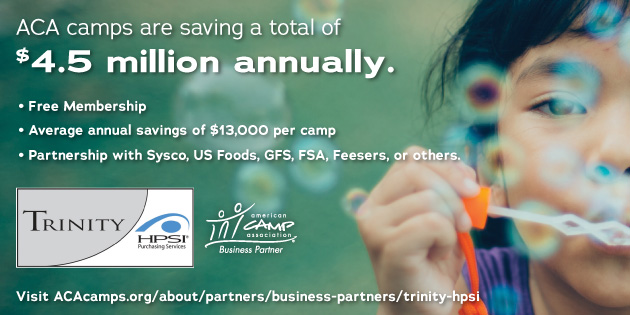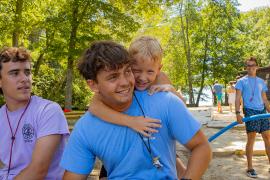You may be reading this before you arrive at camp or within the first few days of making your way to your (new) summer home. Regardless, at this moment you are most likely not thinking about a few weeks, months, or even years from now in terms of your camp path. Your focus is probably on getting adjusted and learning as much about your camp role as possible, so you feel equipped to provide the best possible experience for the campers in your care.
This training time at the beginning of the season in many ways parallels the training an athlete does to prepare for a race. You will do some stretching, conditioning, workouts, and recovery to get yourself in optimal shape for the summer ahead. You will stretch outside of your comfort zone as you embark on this journey for the first time or as a veteran camp staffer. Committing to this job may be a stretch from your typical summer activities; taking on a new role or leadership position may be a stretch into unchartered territory as you supervise or manage others.
When training for a race, conditioning and workouts are calibrated so that an athlete can build up to a desired performance level over time and work through moments of exertion and fatigue. In a similar vein, you will want to gauge your energy and enthusiasm levels to take into consideration what a given situation calls for whether it be at the beginning, middle, or end of the day, week, session, or summer.
As with anything, it is important to aim for moderation versus the extreme. Dedicated athletes train over a period of time and build in opportunities for rest and recovery to allow for peak performance come race day. Effort is given to avoid completely depleting reserves and maintaining a certain level of fitness for future events. You, too, will want to take advantage of times in your schedule for taking a breather and recharging so you don’t wear yourself to exhaustion. This will enable you to work with the next group of campers or continue the session at hand at your full potential.
At the starting line of the summer, we suggest that you think of the race ahead as a marathon and not a sprint. It will be important to avoid expending all your energy in the initial burst of opening weekend, but rather that you pace yourself for the miles ahead. Using various research-based suggestions given here, you will be on your way to establishing habits that will afford you an enjoyable camp experience for this and possibly many summers to come.
We know that working at camp — both day and overnight camp — leads to anticipating an exciting, fun, and intense summer. You are undoubtedly looking forward to making new friends, connecting with old friends, and working with campers while helping them to grow and have fun in the process. You’ll likely even learn new skills while at camp.
You will help campers to become members of the camp family, feel loved, grow, and learn — up to 24 hours a day, seven days a week. During the camp session you will be expected to be “on,” with high energy, focus, and service to campers and your peers. Maintaining a level of enthusiasm and your own desire to ensure a powerful experience for campers requires physical stamina, mental health, and emotional regulation — being able to manage your own emotions in light of all that camp demands.
At day camps, staff go home at the end of the day and have weekends to engage in a range of behaviors that allow for real rest before returning to camp and the responsibility of campers in their care. At overnight camps, the situation is different. Staff are on 24 hours of the day every day that camp is in session. In the midst of camp, however, you will be scheduled to have days off — just for yourself and away from camp. Regardless of being at a day or overnight camp, the intent of time away from camp and campers is to enable you to recharge and rejuvenate in time for the next day or week of camp activities and/or new campers.
Like many staff, you may use your time off to engage in adult activities, perhaps going to a pub or party; or perhaps you’ll meet up with friends for a high-energy gathering. The chosen activities are often a way to release the stresses of the camp week. We’ve discovered, however, that the day off can be just as exhausting as the previous week of camp and that staff sometimes return to camp not rested and relaxed, but simply moving from one state of tiredness to another (Dubin and Garst, 2020). All levels of staff — counselors, administrators, medical staff, and others — can feel this sense of weariness. And, it’s important to remember that when you return to camp feeling tired, that lack of energy affects the entire camp community.
We know that at overnight camps it can be fatiguing to live in close proximity to others, sharing bathrooms, sleeping quarters, meals, and all aspects of daily life. So, what’s a staff member to do? How and when do you engage in self-care? And what is involved in self-care? How do you take care of your own physical, mental, and emotional needs? What do these processes look like? What do they feel like? How can you recognize the need for such rest, and what can you do about it?
First, it is important to work to recognize your need for real rest throughout the week — during camp day downtime as well as on time off. This requires a level of self-awareness and drive to make choices that lead to real rest during discretionary time. Ask your camp director for suggestions about how to get effective rest during the camp day. Take opportunities during quiet times during the day to reflect on or manage your own fatigue — physical, mental, and emotional. Take needed actions to get that rest. Research shows us that having conversations with peers and journaling can help staff to articulate personal needs (Ellis, Jiang, Locke, Woosley, Co, & Snider, 2020).
Emotional needs are often overlooked by camp staff. Yet, as Baker (2020) tells us, “Camp counselors’ employment experiences are full of emotional highs and lows; the thrill of connecting with campers to the fatigue of long hours and physical activity.” Camp life demands a lot of emotional commitment and expenditures, which can lead to weariness. Baker noted that the majority of counselors do not take purposeful time to process their emotions or to recover from the intensity of emotions felt at camp. Yet, this is an important component to taking care of oneself. As everyone is different from everyone else, what processing one’s emotions looks like will depend on each individual. Thus, when you are feeling emotionally drained, it is important to first recognize those feelings, then address them in a way that helps you and fits within the camp culture.
In preparing for a marathon, acknowledging and confronting your feelings of fatigue are necessary steps to maintain physical and mental well-being. Runners, if they feel a drop in energy coming on, work to find ways to rest and recover before the next training day. It is common practice to taper training and physical activity leading up to race day. Then race day arrives, and the runners are off! At the end of the marathon they assess the run, the training that built up to the run, and the impact of the run on their bodies and minds. Something similar occurs in camp as well.
It is during or after their race assessment that marathoners decide if they want to run another marathon. And many runners suggest that after running one marathon people will want to do it again. In camp, as staff, you will assess yourselves and your experiences over the summer and decide if you want to return to camp next year. Such a decision can be a challenge as you weigh the pros and cons of returning. Most likely, your camp directors want you to return — it’s an opportunity to share your newly learned skills, energy, commitment, and whole self to engage with campers for a subsequent summer. How do you decide?
A group of researchers discovered that when staff purposely reflect on what they learned about themselves during the summer they were more likely to return for another summer (Ellis et al., 2020). Staff often don’t recognize the personal growth they experience while working at camp until long after their camp employment has ended (Mateer, Taff, Allison, Hunt, & Will, 2020). However, Ellis et al. found that one way to help staff articulate that growth was for them to engage in focused discussions with other staff and to do some journaling.
Talking about the day’s highlights where staff felt they worked independently, did something particularly well, and felt a sense of connectedness with others helped them to see how working at camp was helping them to grow and make a difference in the lives of others. If you can find time to have similar conversations and talk about successes with your peers, you might very well use that assessment in determining whether to return to camp the next summer.
Another team of researchers, Warner, Richmond, and Sibthorp (2020), also looked at staff retention. Not surprisingly, staff decided to return to camp because they felt like they were making a difference, they enjoyed the work, and/or had an emotional attachment to camp (felt like they belonged). If this is your second, third, or fourth year of working at camp, you likely agree with these findings. Camp does make a difference in the lives of staff as well as campers!
On the other hand, staff were found to not return for subsequent summers because of poor pay, better job opportunities, and educational opportunities. While this may make sense, it is important to put things into perspective. Consider that while the money earned while working at camp may not seem like a lot when looking at the actual paycheck, the free meals, lodging (utilities included), laundry, little or no need for a car and gas, and other living requirements taken care of can actually result in more take home pay than if you worked in a more traditional job and those expenses had to be covered.
If you are in college, you are likely aware that at some point someone is going to tell you that you need to complete an internship or work in a field related to your college education. The good news is that, even if working at camp is not related to your career goals, jobs at camp can be designed to meet those goals. This is called job-crafting, and many camps can help match camp work with careers for a range of college majors. Be sure to ask your director about these types of opportunities as you are looking to return to camp for future summers.
In addition to helping to job-craft camp positions for college, the vast majority of skills learned at camp translate directly to the workforce. Skills such as collaboration, a strong work ethic, communication, creativity, and critical thinking are all highly desirable by employers in any field (Richmond, Sibthorp, & Bialeschki, 2020). By highlighting these (and other similar skills) on your resume, you can demonstrate that your camp employment has positioned you for success regardless of your career path.
Working at camp is a marathon, not a sprint. Take each mile in stride. Walk if you need to. Pay attention to your ups and downs. Make use of breaks to refresh and recharge. Cheer on your fellow teammates. Enjoy the experience. Be proud of crossing the finish line. The medal you earn is the satisfaction of knowing you made a difference in the lives of your campers. We hope to see you back at the summer camp starting line next year!
Discussion Questions:
- What are some options for time off that will allow you to return to camp rested and ready to be at your best with campers and for camp duties?
- When feeling emotionally drained at home or school, what strategies help you bounce back? How can those same approaches be used or adapted while at camp?
- How can you utilize your skills and interests to job-craft your role for future summers at camp that align with career requirements and aspirations?
Additional Resources
Project Real Job Resources to help translate camp on your resume (and more)..
References
- Baker, M. (2020). Supporting the emotion work of camp counselors. Presented at the American Camp Association National Conference, San Diego, CA.
- Dubin, A. & Garst, B. (2020). Fatigue at summer camp: Perspectives from camp nurses and directors. Presented at the American Camp Association National Conference, San Diego, CA.
- Ellis, G., Jiang, J., Locke, D., Woosley, J., Co, L. & Snider, C. (2020). Case study: Building retention intentions of summer camp staff through psychological needs-based reflection experiences. Presented at the American Camp Association National Conference, San Diego, CA.
- Mateer, T., Taff, D., Allison, P., Hunt, C., & Will, E. (2020). Exploring the changing meaning of camp counselor work throughout emerging adulthood. Presented at the American Camp Association National Conference, San Diego, CA.
- Warner, R., Richmond, D., & Sibthorp, J. (2020). The effects of non-camp and camp factors on summer camp retention. Presented at the American Camp Association National Conference, San Diego, CA.
Deb Jordan, ReD, is a professor at East Carolina University and speaks and writes about topics of interest to camps and other entities on a wide range of topics. She also serves as the Standards Co-Chair for the Southeast Local Council of Leaders, contributes to Camping Magazine, presents webinars, and is co-chair of the ACA Project Real Job Committee.
Kim Aycock, MST, has 30+ years of experience developing young people with skills robots are unable to do. Blending the talent of a master teacher with the knowledge of a seasoned camp expert, Kim ignites learning for varying levels of campers and staff worldwide. She speaks professionally at conferences, presents webinars, contributes regularly to Camping Magazine and ACA blogs, and serves as co-chair of ACA’s Project Real Job Committee. More information can be found at kimaycock.com.
Laurie Browne, PhD, is ACA’s director of research. She specializes in ACA’s Youth Outcomes Battery and supporting camps in their research and evaluation efforts. Prior to joining ACA, Laurie was an assistant professor in the Department of Recreation, Hospitality, and Parks Management at California State University–Chico. Laurie received her PhD from the University of Utah, where she studied youth development and research methods.




